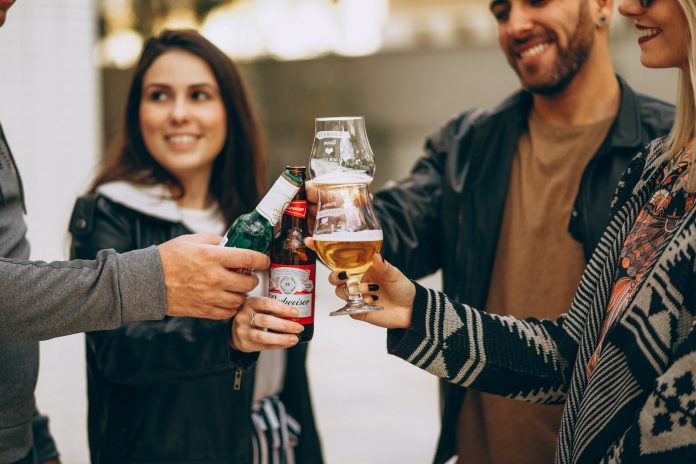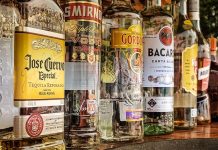
The “Magical” Journey: How Bullying Becomes the Gateway to Teen Alcohol Addiction
Once upon a time, in the kingdom of High School, a dark and sinister phenomenon lurked in the hallways, the dreadful act known as bullying. Little did we know, it held a secret power, an ability to transform innocent teens into alcohol-consuming maniacs!
Our tale begins with the innocent and unsuspecting protagonist, Timmy, a bright-eyed teenager. Timmy, like any typical high school student, dealt with the occasional teasing and mockery from his peers. Little did he know that these seemingly harmless jabs were about to unlock a hidden path to alcohol addiction.
The relentless bullies, armed with their witty insults and taunts, inadvertently turned Timmy into the ultimate rebel. Unable to handle the emotional rollercoaster, Timmy sought solace in the most peculiar of places—the local liquor store.
With each snide remark, Timmy’s desire for revenge grew stronger. He discovered that a sip of alcohol had magical properties, providing him with newfound confidence and the ability to retaliate against his tormentors. Suddenly, he was no longer just Timmy; he was Timmy, the mighty drinker!
As the bullying continued, so did Timmy’s quest for liquid courage. Alcohol became his loyal companion, never judging him or making fun of his quirks. It was always there to lend a sympathetic ear, even if it left him stumbling and slurring his words.
But alas, like any enchanted journey, this one had its dark side. Timmy soon found himself trapped in the vicious cycle of alcohol addiction. What started as a coping mechanism became a dependence, shackling him to the bottle and magnifying his struggles.
In a bizarre twist of fate, the bullies, completely unaware of their role in Timmy’s transformation, reveled in their triumph. They had unwittingly become the catalyst for his spiraling descent into alcohol addiction. Little did they know that their thoughtless acts had spawned a “drunken superhero” who was now controlled by the power of their insults.
Our story serves as a cautionary tale to all high school bullies out there. Beware! Your unkind words and actions might just transform an innocent teen into a teetering drinker. Remember, your witty insults could have unforeseen consequences and might create a drinking monster out of thin air.
So, let us put an end to bullying, not only for the sake of kindness but also to prevent the unintended consequences of fueling a teen’s alcohol addiction. After all, we don’t want any more “liquid superheroes” stumbling around our schools, do we?
Celebrities Who May Have Glamorized Drinking
While it is true that some celebrities have been known to glorify drinking, it’s important to note that this list is not exhaustive, and the influence of celebrities can vary from person to person. Here are a few examples of celebrities who have been associated with promoting or glamorizing drinking:
- Frank Sinatra: Frank Sinatra, a legendary singer and actor, was known for his affiliation with the Rat Pack, a group of entertainers in the 1950s and 1960s. The Rat Pack was often seen socializing and drinking, and their lifestyle was frequently portrayed as glamorous and sophisticated.
- Lindsay Lohan: Lindsay Lohan, a former child star and actress, has had a well-documented history of alcohol-related issues. Her struggles with substance abuse, including alcohol, have been widely publicized, which unfortunately can inadvertently contribute to the glamorization of drinking.
- Johnny Depp: Johnny Depp, a renowned actor, has portrayed characters in movies such as “Pirates of the Caribbean” where heavy drinking is depicted as part of a swashbuckling, adventurous lifestyle. While it is important to note that this is a fictional portrayal, it can still influence how alcohol is perceived.
- Amy Winehouse: Amy Winehouse, a British singer-songwriter, had a troubled life marked by substance abuse, including alcohol. Her struggles with addiction and tragic death at a young age have unfortunately been linked to the romanticization of self-destructive behavior, including heavy drinking.
- The “Wolf of Wall Street” movie: The 2013 film “The Wolf of Wall Street,” directed by Martin Scorsese and starring Leonardo DiCaprio, tells the story of a stockbroker involved in excessive partying and substance abuse, including heavy drinking. The film has been criticized for glamorizing the characters’ behavior and potentially normalizing excessive alcohol consumption.
It’s worth emphasizing that the actions or choices of individual celebrities should not solely be blamed for the decisions made by teenagers. Multiple factors influence a teenager’s behavior, and it’s essential to consider the role of parenting, education, and societal influences as well.
Helping Teens Deal With Alcohol Addiction
When it comes to helping teens deal with alcohol addiction, there are several effective modern approaches that can be beneficial. Here are some of the best methods:
- Early intervention and screening: Identifying alcohol addiction in teens at an early stage is crucial. Schools, healthcare professionals, and parents can implement screening programs to identify at-risk individuals and provide appropriate support.
- Education and awareness: Providing comprehensive education about the risks and consequences of alcohol abuse is essential. Schools and communities can offer programs that focus on alcohol awareness, addiction, and the impact of substance abuse on physical and mental health.
- Individual and family counseling: Therapy and counseling play a significant role in helping teens overcome alcohol addiction. Individual therapy helps teens address underlying emotional and psychological issues that may contribute to their addiction. Family counseling involves engaging parents and family members in the recovery process, improving communication, and providing a supportive environment.
- Support groups: Peer support groups, such as Alcoholics Anonymous (AA) or similar programs designed specifically for teenagers, can be highly beneficial. These groups provide a safe space for teens to share their experiences, learn from others facing similar challenges, and receive guidance from mentors or sponsors.
- Cognitive-behavioral therapy (CBT): CBT is a widely used therapeutic approach that helps teens develop coping strategies and challenge negative thoughts and behaviors related to alcohol use. It focuses on identifying and changing unhealthy patterns of thinking and developing healthier decision-making skills.
- Motivational interviewing: This counseling technique helps teens explore and strengthen their motivation to change their drinking behaviors. It involves non-judgmental conversations that highlight discrepancies between their current behavior and their desired goals, ultimately fostering a commitment to change.
- Medication-assisted treatment (MAT): In some cases, medication may be used as part of a comprehensive treatment plan for teens struggling with alcohol addiction. Medications like naltrexone or acamprosate can help reduce cravings and prevent relapse when combined with therapy and counseling.
- Mobile apps and digital tools: Technology can provide valuable resources and support for teens dealing with alcohol addiction. Mobile apps and online platforms offer self-help resources, tracking tools, virtual counseling, and connection to support networks.
It’s important to note that addressing alcohol addiction in teens requires a comprehensive and individualized approach. The involvement and support of parents, healthcare professionals, therapists, and the community are essential for successful recovery.













